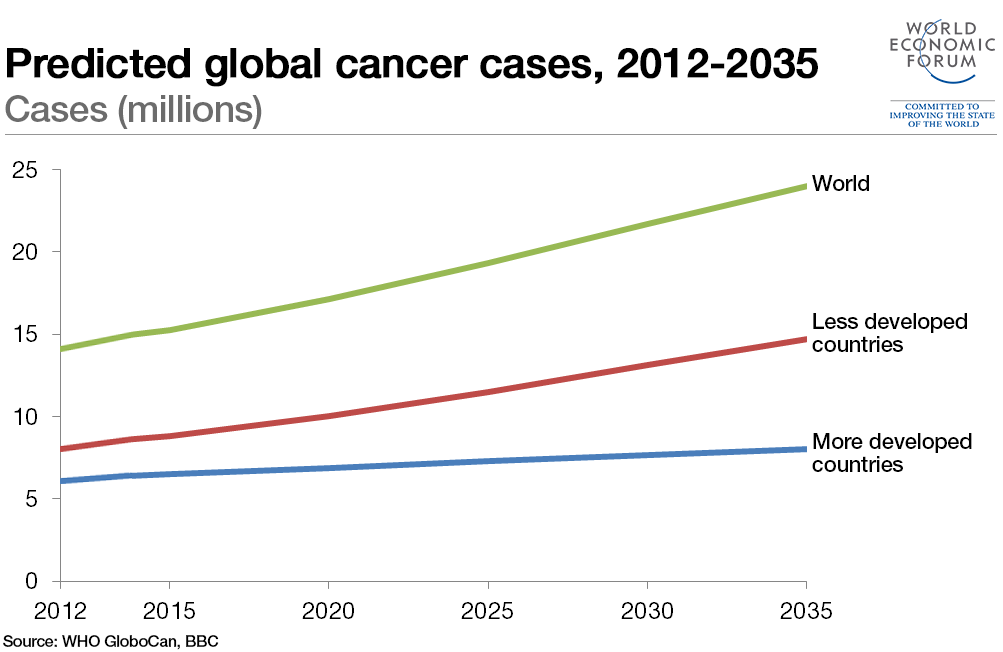Cancer Moonshot: A Call to Action

How can we tackle the world’s biggest killer – cancer? This is the mission of US Vice-President, Joe Biden, who has called for a “moonshot” to find a cure for the disease.
The Vice-President recently penned a piece for the Forum’s blog platform,Agenda, about the moonshot campaign. He has, of course, been touched personally by the disease – his son Beau Biden died of brain cancer in 2015, aged just 46.
Here’s an excerpt from the article, which you can read in full here:
“It’s personal for me. But it’s also personal for nearly every American, and millions of people around the world. We all know someone who has had cancer, or is fighting to beat it. They’re our family, friends, and co-workers…
…And the goal of this initiative is simple — to double the rate of progress. To make a decade worth of advances in five years. Here’s how we can do it:
Over the next year, I will lead a dedicated, combined effort by governments, private industry, researchers, physicians, patients, and philanthropies to target investment, coordinate across silos, and increase access to information for everyone in the cancer community.
Here’s what that means: The Federal government will do everything it possibly can — through funding, targeted incentives, and increased private-sector coordination — to support research and enable progress.We’ll encourage leading cancer centers to reach unprecedented levels of cooperation, so we can learn more about this terrible disease and how to stop it in its tracks.”
This followed President Obama’s announcement, made in his final State of the Union address, that Biden would lead the US government effort to quicken the discovery of a cure.
The White House’s programme has bipartisan appeal, as detailed in this piece from Fast Company, which states:
“In 2015, House Republicans and Democrats overwhelmingly passed the 21st Century Cures Act, which raises funding and lowers barriers for audacious medical research. (The Senate is considering its own version.) The bill’s sponsor (and Chairman of the House Energy and Commerce Committee), Fred Upton,tweeted his support for the Obama-Biden effort.”
The Future of Health is a World Economic Forum Global Challenge. You can read more on why this is so important to us in this piece:
“Increased exposure to risks such as tobacco, physical inactivity and unhealthy dietary patterns are making noncommunicable diseases (NCDs) such as cancer and diabetes the number one killer globally. As the world’s population ages, deaths from NCDs are projected to rise from 38 million in 2012 to 52 million annually by 2030.”

“Think about a world where science would repair the causes of diseases as opposed to reducing the effects of symptoms. Think about a world where cell regeneration science would help diabetes or renal failure patients enjoy disease-free lives as they benefit from early transplants of artificial pancreas and kidney.
“These are the promises of the fourth industrial revolution when it comes to healthcare.”
Vice-President Biden talks about the sheer number of people affected by the disease, as well as his own family’s experience.
Big data is playing a significant role. Tapping the treasure trove of data held by hospitals and other institutions could be key to finding a cure for cancer. With advances in supercomputers, this data is being synched up for the first time in human history. If we can make this readable to scientists, we can speed up research advances and possible treatments. Should this data be more widely available? This is a question that the VP wants to put to today’s panel, and it’s a theme that runs throughout the session.
Personalised medicine, for example, could play a huge role, but what about privacy? One way around this is patient consent, points out panel member Charles Sawyers, but many people may be reluctant to share their details.
David Agus, meanwhile, stresses the importance of looking at outliers in data and research. Elephants, for example, are 40% bigger than humans, but they don’t get cancer. Evolution figured out a way to avoid it. How?
Agus also believes data language needs to be standardized, something the VP strongly agrees with.
The problem with clinical trials, says José Baselga, isn’t just that they are expensive, but that patients don’t know about them, so we have to find a better way to inform patients that this is an option.
Jennifer Doudna talks about the role CRISPR – the editing of human genes – could play in the fight against the world’s most deadly disease. What is this breakthrough technique, and how could it change medicine? Read our explainer on what is one of the hottest topics in science.
Personalised medicine could change the course of cancer, says Paula Hammond. But one challenge is how to get something that is potentially toxic through the body to a tumour, without harming the patient. We need to find ways to package these systems and deliver them. This is something that nanotechnology can help us with – protecting the body while getting the drug to where it needs to go.
Cancers themselves, says Nobel Laureate Elizabeth Blackburn, are a huge impediment. They are wily ecosystems that are changing all the time. We need big data on every person’s tumour.

Finally, says Biden, it’s important to explain the situation to patients in a way that puts them at ease. We also need to educate the public in simple terms as to why we need more of their tax dollars and why this fight is so important.

